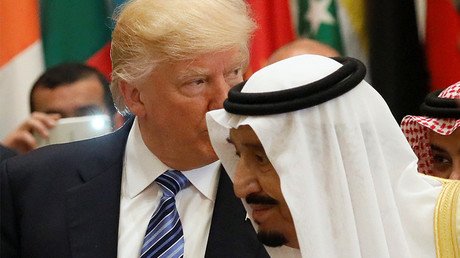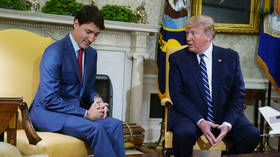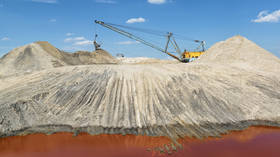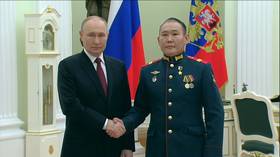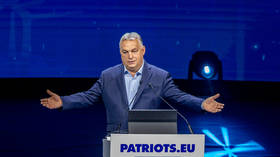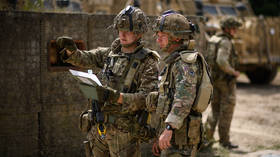US stirring up ‘Iranophobia’ to boost arms sales to Arab nations – Tehran
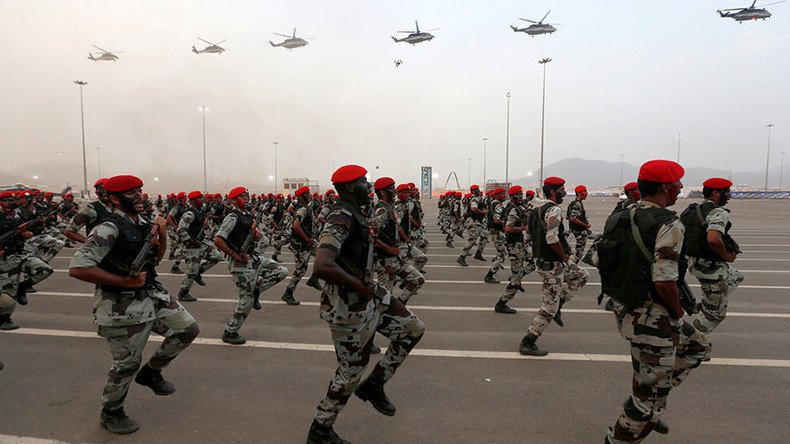
US President Donald Trump has deliberately accused Tehran of sponsoring extremist groups in the Middle East in order to stir up “Iranophobia” and boost American arms sales in the region, Iran’s Foreign Ministry said in a statement.
“Once again, by his repetitive and baseless claims about Iran, the American president... tried to encourage the countries of the [Middle East] region to purchase more arms by spreading Iranophobia,” Iranian Foreign Ministry spokesman Bahram Qassemi said a day after Trump sealed a massive arms deal with Iran’s arch-rival, Saudi Arabia, worth $110 billion.
While in Riyadh, Trump pointed the finger at Iran for spreading instability and unrest across the Middle East while addressing the leaders of 55 Muslim-majority countries.
“From Lebanon to Iraq to Yemen, Iran funds, arms, and trains terrorists, militias, and other extremist groups that spread destruction and chaos across the region,” Trump said, according to a White House press release. “For decades, Iran has fueled the fires of sectarian conflict and terror.”
The tycoon-turned-president also claimed that the Iranian government, which is currently led by moderate President Hassan Rouhani, “speaks openly of mass murder” and vows death to Israel and the US. He also urged America’s Arab allies to isolate Tehran “until the Iranian regime is willing to be a partner for peace.”
Qassemi said Washington was “reinvigorating terrorists in the region by its hostile policies” and “should stop selling arms to dangerous terrorists.”
Iran’s FM spokesman also said the United States and its allies “should know that Iran is a democratic, stable and powerful country” that promotes “peace, good neighborliness, and the creation of a world opposed to violence and extremism.”
Trump doubled down on his criticism of Tehran during his visit to Israel on Monday, insisting that Iran should “never be allowed to possess a nuclear weapon - never, ever,” because he claims the Islamic Republic supports terrorists.
On the other hand, Rouhani said on Monday that regional stability in the Middle East would be impossible to achieve without Iran.
"Who can say regional stability can be restored without Iran? Who can say the region will experience total stability without Iran?" Rouhani said. He also lambasted Trump's address in Riyadh, saying it was a "ceremonial [event] that had no political value and will bear no results."
READ MORE: Iran imposes new sanctions on US-linked companies
Rouhani added that Iran will carry on with its missile program, saying it’s only goal is to provide “peace” and “defense.”
“American officials should know that whenever we need to technically test a missile, we will do so and will not wait for their permission," Rouhani said in a news conference broadcast live on state TV, according to Reuters. He also criticized Saudi Arabia for a lack of democracy, urging Riyadh to allow people to participate in free elections.
On Sunday, Iranian Foreign Minister Mohammed Javad Zarif lashed at Trump for appeasing Saudi Arabia.
“Iran – fresh from real elections – attacked by @POTUS in that bastion of democracy and moderation. Foreign Policy or simply milking Kingdom of Saudi Arabia of $480 billion?” he wrote on Twitter.
Iran—fresh from real elections—attacked by @POTUS in that bastion of democracy & moderation. Foreign Policy or simply milking KSA of $480B? pic.twitter.com/ahfvRxK3HV
— Javad Zarif (@JZarif) May 21, 2017
In an opinion piece for the London-based website al-Araby al-Jadeed, Zarif urged Trump to “enter into dialogue with them about ways to prevent terrorists and takfiris [Sunni extremists] from continuing to fuel the fire in the region and repeating the likes of the September 11 incident by their sponsors in Western countries.”
Tehran and Riyadh have recently engaged in a war of words, accusing each other of undermining security in the Middle East, sponsoring fundamentalist organizations, and seeking dominance in the region.
Both countries have made bellicose statements, with Iran’s defense minister, Hossein Dehghan, telling the Arabic-speaking Al-Manar channel: “We warn them against doing anything ignorant, but if they do something ignorant, we will leave nowhere untouched apart from Mecca and Medina.”
